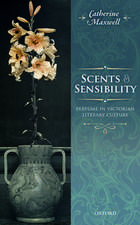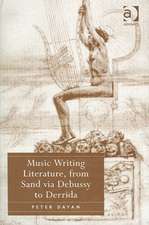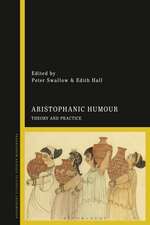Aristophanes in Britain: Old Comedy in the Nineteenth Century: Classical Presences
Autor Peter Swallowen Limba Engleză Hardback – 11 sep 2023
Din seria Classical Presences
- 28%
 Preț: 473.71 lei
Preț: 473.71 lei - 30%
 Preț: 493.26 lei
Preț: 493.26 lei - 27%
 Preț: 476.23 lei
Preț: 476.23 lei - 6%
 Preț: 337.35 lei
Preț: 337.35 lei - 30%
 Preț: 540.38 lei
Preț: 540.38 lei - 28%
 Preț: 474.92 lei
Preț: 474.92 lei - 30%
 Preț: 501.92 lei
Preț: 501.92 lei - 13%
 Preț: 226.46 lei
Preț: 226.46 lei - 25%
 Preț: 687.80 lei
Preț: 687.80 lei - 30%
 Preț: 582.93 lei
Preț: 582.93 lei - 30%
 Preț: 821.25 lei
Preț: 821.25 lei - 26%
 Preț: 614.24 lei
Preț: 614.24 lei - 19%
 Preț: 677.96 lei
Preț: 677.96 lei - 18%
 Preț: 704.79 lei
Preț: 704.79 lei - 30%
 Preț: 538.77 lei
Preț: 538.77 lei - 30%
 Preț: 645.95 lei
Preț: 645.95 lei - 30%
 Preț: 501.52 lei
Preț: 501.52 lei - 30%
 Preț: 617.54 lei
Preț: 617.54 lei - 27%
 Preț: 519.88 lei
Preț: 519.88 lei - 16%
 Preț: 706.89 lei
Preț: 706.89 lei - 25%
 Preț: 554.32 lei
Preț: 554.32 lei - 16%
 Preț: 584.68 lei
Preț: 584.68 lei - 30%
 Preț: 562.14 lei
Preț: 562.14 lei - 30%
 Preț: 598.80 lei
Preț: 598.80 lei - 25%
 Preț: 612.31 lei
Preț: 612.31 lei - 30%
 Preț: 589.73 lei
Preț: 589.73 lei - 30%
 Preț: 789.84 lei
Preț: 789.84 lei - 30%
 Preț: 600.20 lei
Preț: 600.20 lei - 30%
 Preț: 611.82 lei
Preț: 611.82 lei - 29%
 Preț: 1083.87 lei
Preț: 1083.87 lei - 30%
 Preț: 720.23 lei
Preț: 720.23 lei - 19%
 Preț: 326.97 lei
Preț: 326.97 lei - 30%
 Preț: 760.17 lei
Preț: 760.17 lei - 30%
 Preț: 833.88 lei
Preț: 833.88 lei -
 Preț: 307.88 lei
Preț: 307.88 lei - 28%
 Preț: 446.91 lei
Preț: 446.91 lei - 30%
 Preț: 721.88 lei
Preț: 721.88 lei - 30%
 Preț: 575.88 lei
Preț: 575.88 lei - 30%
 Preț: 598.02 lei
Preț: 598.02 lei - 30%
 Preț: 803.03 lei
Preț: 803.03 lei - 30%
 Preț: 733.67 lei
Preț: 733.67 lei - 30%
 Preț: 701.54 lei
Preț: 701.54 lei - 30%
 Preț: 601.52 lei
Preț: 601.52 lei - 30%
 Preț: 747.48 lei
Preț: 747.48 lei - 30%
 Preț: 556.05 lei
Preț: 556.05 lei - 30%
 Preț: 818.03 lei
Preț: 818.03 lei - 30%
 Preț: 716.96 lei
Preț: 716.96 lei
Preț: 501.15 lei
Preț vechi: 715.67 lei
-30% Nou
Puncte Express: 752
Preț estimativ în valută:
95.90€ • 100.38$ • 79.81£
95.90€ • 100.38$ • 79.81£
Carte disponibilă
Livrare economică 26 februarie-04 martie
Preluare comenzi: 021 569.72.76
Specificații
ISBN-13: 9780192868565
ISBN-10: 019286856X
Pagini: 304
Ilustrații: 30 black and white images
Dimensiuni: 160 x 240 x 20 mm
Greutate: 0.64 kg
Editura: OUP OXFORD
Colecția OUP Oxford
Seria Classical Presences
Locul publicării:Oxford, United Kingdom
ISBN-10: 019286856X
Pagini: 304
Ilustrații: 30 black and white images
Dimensiuni: 160 x 240 x 20 mm
Greutate: 0.64 kg
Editura: OUP OXFORD
Colecția OUP Oxford
Seria Classical Presences
Locul publicării:Oxford, United Kingdom
Recenzii
Aristophanes in Britain is a work that is authoritatively researched and full of compelling detail. Swallow suggests that his study represents merely a first step in a topic that deserves much deeper scholarly investigation. But this is to overlook the giant leap forward that his monograph achieves in forging a fresh sub-field in modern Aristophanic reception. The often-discordant nature of Aristophanes' satire made it harsh on nineteenth-century ears. Swallow's book demonstrates, however, how his works could be transposed into different keys throughout the century for purposes cultural and political. Despite attempts at censorship and manipulation, Aristophanes emerges in Peter Swallow's book as a figure whose savage wit remained as barbed and penetrating in nineteenth-century Britain as it had in fifth-century Athens.
Notă biografică
Peter Swallow is a Research Fellow at the Department of Classics and Ancient History, Durham University, working on the popular reception of Aristotle. Previously, he held a postdoctoral position at the Centre for Hellenic Studies, King's College London, and taught at both KCL and Goldsmiths. He edited Aristophanic Humour with Edith Hall (2020). Peter has also taught at Notting Hill and Ealing High School, and since 2017 has worked with the Advocating Classics Education project to expand access to classical education in schools.






















